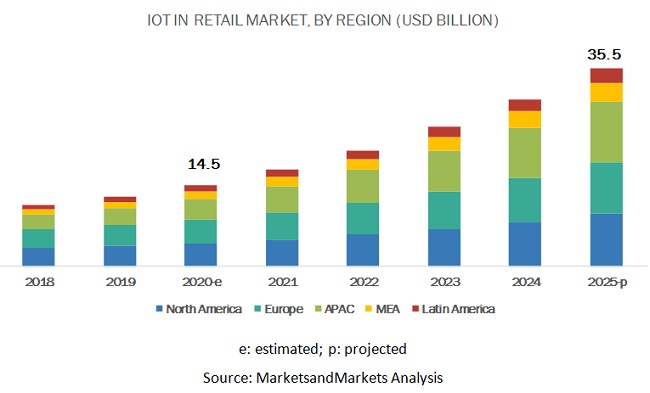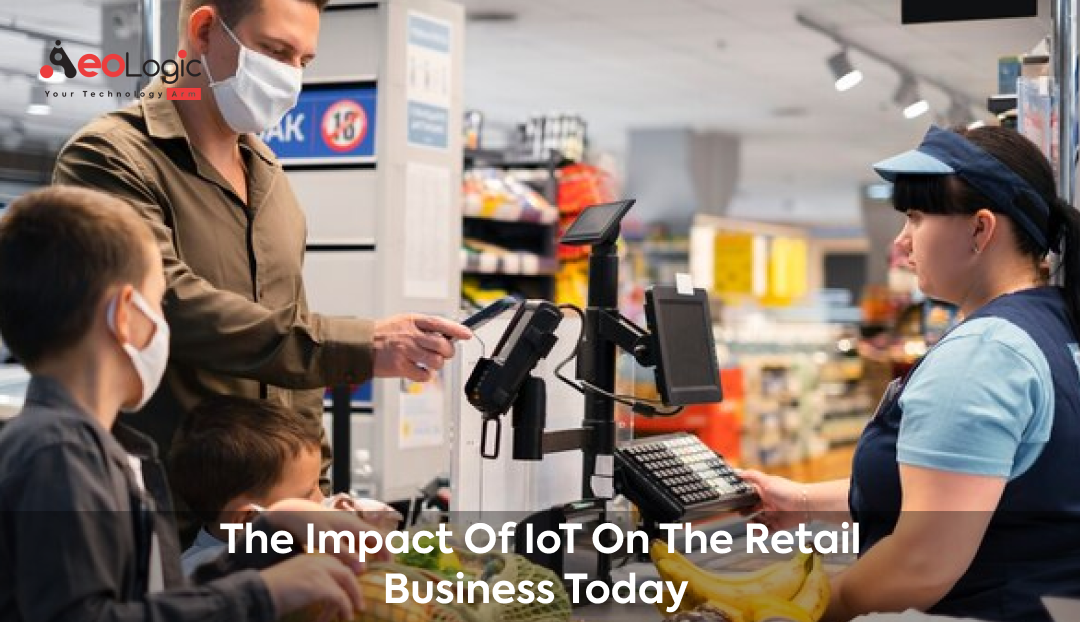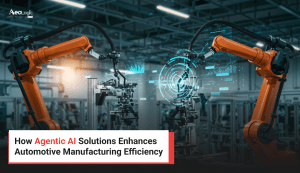The impact of IoT in the retail business is a key indicator of a country’s economic health, often being the first to show signs of trouble during hard times. It’s important to improve and make more money in the retail sector using digital tools, especially considering the influence of IoT. Right now, retail stores face intense competition. Those using modern technology, like IoT, are doing well and will likely achieve greater success later. A major modern technology is the Internet of Things, or IoT.
IoT is a network of small devices with sensors that connect to the internet. These devices collect and share data instantly. Both individuals and companies are using IoT tech, from phone features controlling other devices to fire alarms in tall buildings, all working with sensors. Research by Statista shows that by 2030, the number of devices connected by IoT will rise to about 25.44 billion. So, for businesses looking to grow, now is a good time to start using IoT.
Also Read: Optimizing Business Operations with IoT Solutions
The Impact of IoT in Retail Market

The impact of IoT in retail means the infrastructure comprised of physical devices, objects & spaces that can be whole or bit with Bluetooth beacons, sensors that are capable of positioning a device using Global Positioning System (GPS) technology& Radio-frequency identification RFID as well. It allows the brands to keep a record of their assets & inventory along with knowing its availability, condition and location at any time anywhere. By linking and exchanging data with systems & devices over the internet, retailers gain 360-degree visibility.
Listed below are two of the most common IoT applications in the retail industry:
Data collection & sharing: Sensors placed in devices aid tracking of both product and shopping lifecycle. This would involve monitoring a wide range of data such as environmental & equipment, asset performance and stocks quantities among others. This valuable information can be stored, transited or analyzed with the help of algorithms to obtain intelligent patterns that will allow for further optimization.
Process automation: A possibility is to partially or fully automate IoT-enabled stores and devices in order to ensure the effectiveness, sustainability & resilience of retail operations and processes. Additionally, retail automation allows speeding up the supply chain activities that include inventory management and order fulfillment & checkout.
Also Read: Top IoT Security Challenges and Solutions
Positive Impact of IoT in Retail Industry
In 2023, there are numerous advantages to implementing the Internet of Things concept within a retail establishment. Several of these positive integral effects are described in the following paragraphs:
1. Enhanced Supply Chain Management
Supply chain optimization is necessary for a retailer as it impacts on the level of efficiency which in turn helps to save valuable business time. IoT is a perfect and cost-saving method to enhance the supply chain. Integrated with other technologies such as RFID and GPS, it gives the retailers visibility thus they can know where the product was placed and can monitor movements off that point. Along the same lines, this increased level of visibility has also led to increased accuracy when it comes to estimating the time for delivery.
In this way, IoT enables vendors and retailers to select delivery partners or the actual route of deliveries depending on operating costs as well as safety.
2. Enhanced Customer Experience
IoT has great promise to enable a much better consumer experience at every level of interaction. IoT can do everything from fetching user data, purchase trends, consumer activity to favorite products and real-time inputs collecting accurate information & making based on it almost predictive suggestions for a flawless retail customer experience.
Collecting necessary information from customers allows retail businesses to personalize their marketing and sales approaches and also helps in avoiding irrelevant advertisements or digital advertising campaigns that often end up with low customer satisfaction scores. Therefore, it is possible that more pertinent products and services are thus provided by such businesses that focus on ensuring a seminal emphasis on realizing a better client experience.
3. Improved Scope of Inventory Management
Thus, IoT can assist retail enterprises in streamlining the activities related to inventory management through accessing and deploying up-to-date information on supply chain trends, sales performance aspects consumer demand patterns along with behavior of consumers during interaction processes push purchasing behaviors. This allows business organizations to avoid having stock that is more than enough and hence prevents the waste involved.
It also gives them a chance to introduce newer products according to the needs of consumers and eliminate old or out-of-date stock. Additionally, this helps enhance general business operations and minimizes costs in stocking products offered or warehousing.
4. Automated Payment
Following their purchase, shoppers frequently have to wait in lengthy lines to pay and check out. Nobody like waiting, and occasionally the customer experience may suffer; automated checkouts assist in addressing this issue. Customers merely need to scan the barcode of the goods without any assistance when using automated checkouts that are supported by the Internet of Things (IoT). This makes the procedure more efficient and increases customer satisfaction. Because automated checkout requires less assistance, even shops can save their surplus expenditures. Retailers can cut the number of employees because only two or three people can assist a consumer in need.
5. Food Safety Surveillance
In the perishable goods industry, maintaining food items’ freshness is crucial, and even a small mistake can result in a significant loss of revenue. In this case, IoT can be quite helpful because it allows retailers to regulate storage room temperatures. By installing sensors, retailers can be alerted when temperatures exceed or fall below predetermined thresholds.
IoT in food safety lowers the possibility of error and saves money because it requires less human contact. Perishable food items will eventually have a longer shelf life if there is more real-time monitoring.
It is obvious that the retail sector is evolving, and Internet of Things (IoT) will be essential to realizing this promise. Apart from the aforesaid benefits, IoT also helps in: – tracking the most sold product in a convenience shop, evaluating consumers’ buying trends, offering better customer service, placing beacons, and much more.
Several IoT sensors that monitor temperature, location, humidity, and other parameters can also help a retail business establish a brand identity. They can alter them to better meet the needs of their customers. Not only that, but smart inventory management, improved logistics through integrated IoT devices, even energy control and management using IoT devices, smart shopping carts that increase customer interaction, and much more.
While the impact of IoT in retail has already seen growing prominence in several arenas of the retail industry, it has so much more to offer. IoT has several impacts, such as improved customer experience, efficient inventory and supply chain management, easier diurnal operations, higher security possibilities, and higher sales, among others.
Boost your business with our IoT Solutions
How Aeologic Technologies Can Help Retailers Utilize IoT?
Aeologic Technologies empowers retailers to harness IoT’s potential, offering innovative solutions to streamline operations and enhance customer experiences. By integrating IoT technology, they provide real-time data analytics, improve inventory management, and enable smart store features. Their expertise ensures retailers stay ahead in a competitive market, leveraging IoT for operational efficiency, personalized customer interactions, and increased profitability.










